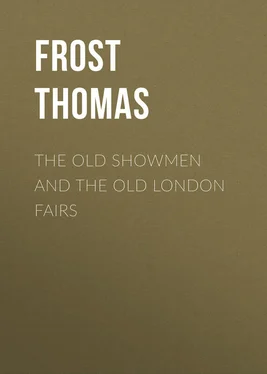Thomas Frost - The Old Showmen and the Old London Fairs
Здесь есть возможность читать онлайн «Thomas Frost - The Old Showmen and the Old London Fairs» — ознакомительный отрывок электронной книги совершенно бесплатно, а после прочтения отрывка купить полную версию. В некоторых случаях можно слушать аудио, скачать через торрент в формате fb2 и присутствует краткое содержание. Жанр: foreign_antique, foreign_prose, на английском языке. Описание произведения, (предисловие) а так же отзывы посетителей доступны на портале библиотеки ЛибКат.
- Название:The Old Showmen and the Old London Fairs
- Автор:
- Жанр:
- Год:неизвестен
- ISBN:нет данных
- Рейтинг книги:4 / 5. Голосов: 1
-
Избранное:Добавить в избранное
- Отзывы:
-
Ваша оценка:
- 80
- 1
- 2
- 3
- 4
- 5
The Old Showmen and the Old London Fairs: краткое содержание, описание и аннотация
Предлагаем к чтению аннотацию, описание, краткое содержание или предисловие (зависит от того, что написал сам автор книги «The Old Showmen and the Old London Fairs»). Если вы не нашли необходимую информацию о книге — напишите в комментариях, мы постараемся отыскать её.
The Old Showmen and the Old London Fairs — читать онлайн ознакомительный отрывок
Ниже представлен текст книги, разбитый по страницам. Система сохранения места последней прочитанной страницы, позволяет с удобством читать онлайн бесплатно книгу «The Old Showmen and the Old London Fairs», без необходимости каждый раз заново искать на чём Вы остановились. Поставьте закладку, и сможете в любой момент перейти на страницу, на которой закончили чтение.
Интервал:
Закладка:
At the dissolution of monasteries, in the reign of Henry VIII., the tolls which had been payable to the priory of St. Bartholomew were sold to Sir John Rich, then Attorney-General; and the right to hold the fair was held by his descendants until 1830, when it was purchased of Lord Kensington by the Corporation of London, and held thereafter by the City chamberlain and the town clerk in trust, thus vesting the rights and interests in both fairs in the same body.
Westminster Fair, locally termed Magdalen’s, was established in 1257, by a charter granted by Henry III. to the abbot and canons of St. Peter’s, and was held on Tothill Fields, the site of which is now covered by the Westminster House of Correction and some neighbouring streets.
The three days to which it was originally limited, were extended by Edward III. to thirty-one; but the fair was never so well attended as St. Bartholomew’s, and fell into disuse soon afterwards.
There was another fair held in the adjoining parish of St. James, the following amusing notice of which in Machyn’s diary is the earliest I have been able to find: —
“The xxv. day of June [1560], Saint James fayer by Westminster was so great that a man could not have a pygg for money; and the bear wiffes had nother meate nor drink before iiij of cloke in the same day. And the chese went very well away for 1 d. q. the pounde. Besides the great and mighti armie of beggares and bandes that were there.” Beyond the fact that it was postponed in 1603 on account of the plague, nothing more is recorded concerning this fair until 1664, in which year it was suppressed, “as considered to tend rather to the advantage of looseness and irregularity than to the substantial promoting of any good, common and beneficial to the people.”
Southwark Fair, locally known as Lady Fair, was established in 1462 by a charter granted by Edward IV. to the City of London, in the following terms: —
“We have also granted to the said Mayor, Commonalty, and Citizens, and their successors for ever, that they shall and may have yearly one fair in the town aforesaid, for three days, that is to say, the 7th, 8th, 9th days of September, to be holden, together with a Court of Pie-Powders, and with all the liberties to such fairs appertaining: And that they may have and hold there at their said Courts, before their said Minister or deputy, during the said three days, from day to day, hour to hour, and from time to time, all occasions, plaints, and pleas of a Court of Pie-Powders, together with all summons, attachments, arrests, issues, fines, redemptions, and commodities, and other rights whatsoever, to the said Court of Pie-Powders in any way pertaining, without any impediment, let, or hindrance of Us, our heirs or successors, or other our officers and ministers soever.”
This charter has sometimes been referred to as granting to the Corporation the right to hold a fair in West Smithfield, in addition to the fair the tolls of which were received by the priory of St. Bartholomew; but that “the town aforesaid” was Southwark is shown by a previous clause, in which it is stated that “to take away from henceforth and utterly to abolish all and all manner of causes, occasions, and matters whereupon opinions, ambiguities, varieties, controversies, and discussions may arise,” the King “granted to the said Mayor and Commonalty of the said City who now be, and their successors, the Mayor and Commonalty and Citizens of that City for the time being and for ever, the town of Southwark, with its appurtenances.”
The origin of Camberwell Fair is lost in the mist of ages. In the evidence adduced before a petty sessions held at Union Hall in 1823, on the subject of its suppression, it was said that the custom of holding it was mentioned in the ‘Domesday Book,’ but the statement seems to have been made upon insufficient grounds. It commenced on the 9th of August, and continued three weeks, ending on St. Giles’s day; but, in modern times, was limited, like most other fairs, to three days. It seems to have been originally held in the parish churchyard, but this practice was terminated by a clause in the Statute of Winchester, passed in the thirteenth year of the reign of Edward I. It was then removed to the green, where it was held until its suppression. Peckham Fair seems to have been irregular, and merely supplementary to Camberwell Fair.
Stepney Fair was of less ancient date. In 1664 Charles II., at the instance of the Earl of Cleveland, then lord of the manor of Stepney, granted a patent for a weekly market at Ratcliff Cross, and an annual fair on Michaelmas day at Mile End Green, or any other places within the manor of Stepney. The keeping of the market and fair, with all the revenues arising from tolls, etc., was given by the same grant, at the Earl of Cleveland’s request, to Sir William Smith and his heirs for ever. The right continued to vest in the baronet’s descendants for several years, but long before the suppression of the fair it passed to the lord of the manor, which, in 1720, was sold by the representatives of Lady Wentworth to John Wicker, Esquire, of Horsham, in Sussex, whose son alienated it in 1754. It is now possessed by the Colebrooke family.
The ceremonies observed in opening fairs evince the importance which attached to them. On the eve of the “great fair” of Wolverhampton, held on the 9th of July, there was a procession of men in armour, preceded by musicians playing what was known as the “fair tune,” and followed by the steward of the deanery manor and the peace-officers of the town. The custom is said to have originated with the fair, when Wolverhampton was as famous as a mart of the wool trade as it now is for its ironmongery, and merchants resorted to the fair, which formerly lasted fourteen days, from all parts of England. The necessity of an armed force for the maintenance of order during the fair in those days is not improbable. This custom of “walking the fair,” as it was called, was discontinued in 1789, and has not since been revived.
The October fair at Croydon was opened as soon as midnight had sounded by the town clock, or, in earlier times, by that of the parish church; the ceremony consisting in the carrying of a key, called “the key of the fair,” through its principal avenues. The booth-keepers were then at liberty to serve refreshments to such customers as might present themselves, generally the idlers who followed the bearer of the key; and long before daylight the field resounded with the bleating of sheep, the lowing of cattle, the barking of dogs, and the shouting of shepherds and drovers.
The metropolitan fair of St. Bartholomew was opened by a proclamation, which used to be read at the gate leading into Cloth Fair by the Lord Mayor’s attorney, and repeated after him by a sheriff’s officer, in the presence of the Lord Mayor, aldermen, and sheriffs. The procession then perambulated Smithfield, and returned to the Mansion House, where, in the afternoon, those of his lordship’s household dined together at the swordbearer’s table, and so concluded the ceremony.
CHAPTER II
Amusements of the Fairs in the Middle Ages – Shows and Showmen of the Sixteenth Century – Banks and his Learned Horse – Bartholomew Fair in the time of Charles I. – Punch and Judy – Office of the Revels – Origin of Hocus Pocus – Suppression of Bartholomew Fair – London Shows during the Protectorate – A Turkish Rope-Dancer – Barbara Vanbeck, the Bearded Woman.
Numerous illuminations of manuscripts in the Harleian collection, many of which were reproduced in Strutt’s work on the sports and pastimes of the English people, having established the fact that itinerant professors of the art of amusing were in the habit of tramping from town to town, and village to village, for at least two centuries before the Norman Conquest of this country, there can be no doubt that the fairs were so many foci of attraction for them at the times when they were respectively held. As we are told that the minstrels and glee-men flocked to the towns and villages which grew up under the protection of the baronial castles when the marriage of the lord, or the coming of age of the heir, furnished an occasion of popular revelry, and also when the many red-letter days of the mediæval calendar came round, we may be sure that they were not absent from Bartlemy fair even in its earliest years.
Читать дальшеИнтервал:
Закладка:
Похожие книги на «The Old Showmen and the Old London Fairs»
Представляем Вашему вниманию похожие книги на «The Old Showmen and the Old London Fairs» списком для выбора. Мы отобрали схожую по названию и смыслу литературу в надежде предоставить читателям больше вариантов отыскать новые, интересные, ещё непрочитанные произведения.
Обсуждение, отзывы о книге «The Old Showmen and the Old London Fairs» и просто собственные мнения читателей. Оставьте ваши комментарии, напишите, что Вы думаете о произведении, его смысле или главных героях. Укажите что конкретно понравилось, а что нет, и почему Вы так считаете.












